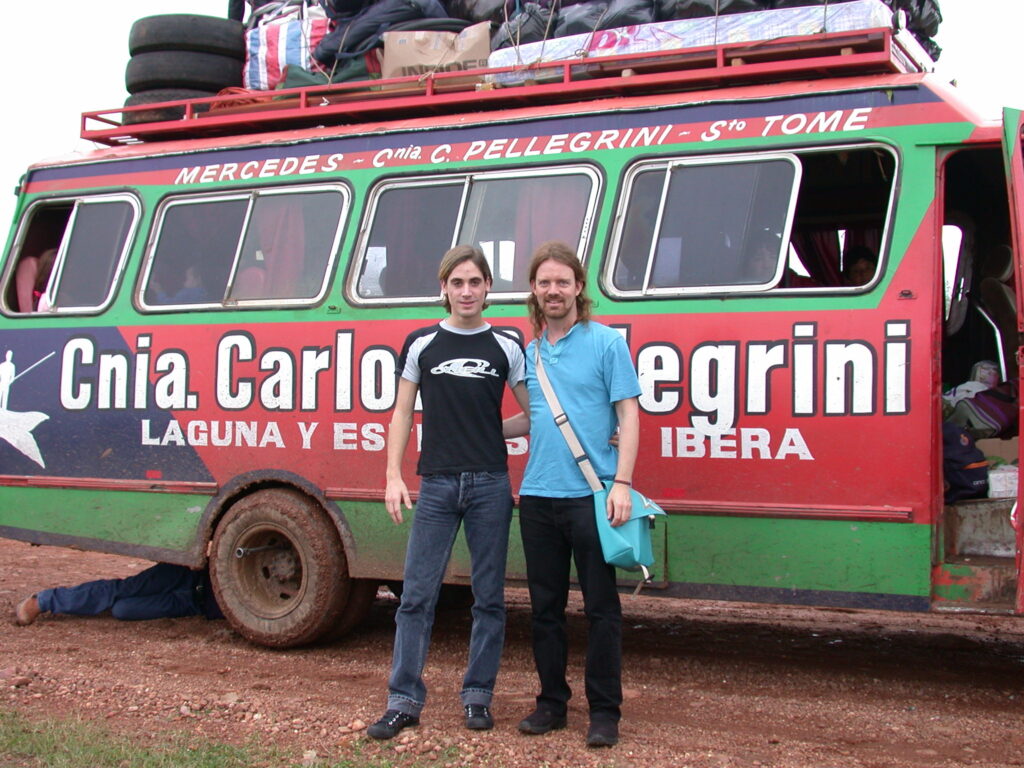After grabbing a quick breakfast at Hotel El Sol, Guille and I took a taxi to the bank where we kept the young driver waiting for more than a half hour while changing money. We made it to the bus station in time to catch the bus for Colonia Pelligrini, the site of the ecological reserve called Esteros de Ibará.
The bus ride was crazy — an old bus packed full of people and supplies. We traveled to several local homes looking for passengers before heading on our way to Colonia Pelligrini. The road was packed dirt and quite muddy in places where the rain from a recent storm gathered.
Along the way, we came across a broken-down van with several tourists and a drunk man, probably a migrant ranch worker, who we dubbed the “cowboy”. After shuffling people and luggage around for half an hour, we were ready to continue on our way.
About ten minutes later, the bus’ motor died and the driver and faretaker went through a complex procedure to get it started again. This gave us a welcome break to stretch our legs from the cramped position we were in.

The drunk cowboy offended Guille when he boarded with a muddy bag that he rubbed on Guille’s coat and hand as he sat down, practically in Guille’s lap. Finally, I told the guy to move over onto the wooden plank the faretaker had placed across the middle aisle for him to sit on. Guille said it wasn’t necessary — I replied that it was for me, not for him — and I could see that Guille was relieved when the guy did move over.
Then he started coming on to the Spanish woman seated nearby, which horrified most of the people on the bus. I wanted to help, but there wasn’t much I could do except ask her if she was upset and wanted to change seats. She said she preferred not to change, but eventually the outrage of the other passengers was so great that a forceful local woman practically dragged her to another seat, which she admitted afterwards was more pleasant.
A little while later, we noticed the smell of wine on the bus and a puddle of wine on the floor. Several people checked the cases of wine stored on the floor to see if they had broked, but it turned out that it was a box of wine in the dirty bag the cowboy brought on board that had spilled everywhere. He took the box of wine out of the bag and started drinking more. He was so drunk that even Guille couldn’t understand much of his Spanish. He claimed to have German parents and tried to speak a few words of German with me.
His skin was the texture of leather, hardened and bronzed by the sun. Had he not been eternally drunk, he could have been a handsome man. Finally, he got off the bus at a local ranch and tried to persuade a man there to hire him, or so it seemed.
As we neared the ecological reserve, we saw more of the diversity of animal and plant life, including the first capibaras, known locally as carpinchos, that I had ever seen. Guille calls them big rats, but I think of the carpinchos as huge guinea pigs and I find them adorable. For that reason, I gave Guille the nickname of “carpinchito” (small capibara).
The bus ride scheduled for three hours ended up taking six hours, but we did finally, after miles of “mud skiing,” end up at Colonia Pelligrini, where there is a charming campground and the wonderful Ypa Sapukai hotel where we are staying. After watching the sunset from a little tower on the hotel grounds, we had a vegetarian meal and slept well.
